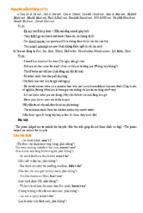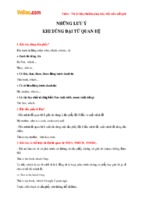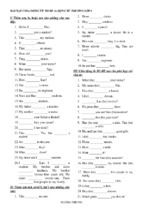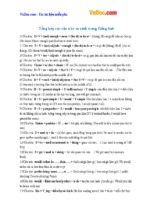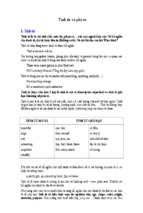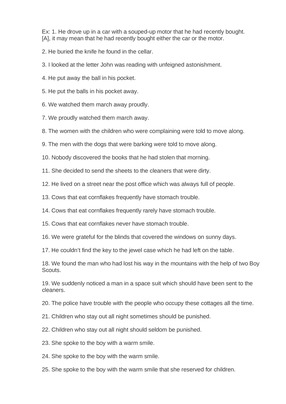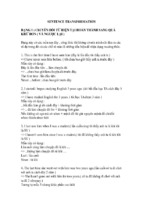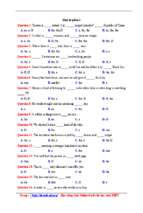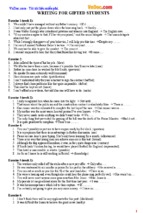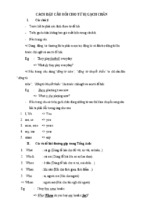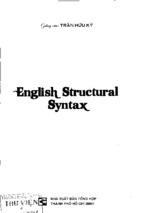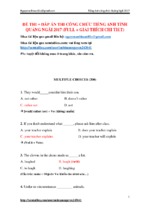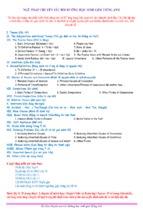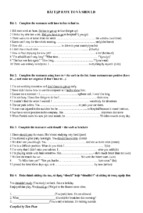Chuyên đề những điểm ngữ pháp tiếng Anh (rõ ràng, dễ hiểu)
ÔN TÂÂP NGỮ PHÁP (TRÌNH ĐÔ Â B)
TÓM TẮT CÁC THÌ VÀ CÁCH DÙNG
3. Present Perfect (Hiện tại tiếp diễn)2. Present Continuous ( Hiện tại đơn)1. Simple Present
TENSES
FORMULAS
+
?
_
To be
S + am /is / are + …
Ordinary Verb ( ĐT thường )
S + Vo / V-s / V-es + …
Am / Is / Are + S + … ?
Do / Does + S + Vo + …?
S + am / is / are + not + …
S + do / does + not + Vo + …
+
Am / Is / Are + S + V-ing + …?
_
S + has / have + V-ed / V3 + …
?
Has / Have + S + V-ed / V3 + …?
§ Một sự việc hiện hữu
§ Một tập quán ( thói quen ) hay
một việc lập đi lập lại
§ Một sự thật hiển nhiên
§ Một qui luật tự nhiên / khoa
học
§ Một câu cảm thán bắt đầu
bằng “here”, “there”
Right away, Right now,
Now, At present, At the
moment, At this time …,
Today
Already, Yet,
Recently,
Lately, Ever, Never, So
far, Up to now, Since,
For, Several times,
Just.
This is + the +
§ Một hành động vừa mới xong.
§ Một hành động vừa xảy ra
trong quá khứ còn kéo dài đến
hiện tại.
§ Một hành động đã xong mà
thời điểm không xác định rõ
ràng.
S + am / is / are + not + V-ing + ...
+
USES
§ Một hành động xảy ra trong
lúc nói.
§ Một hành động xảy ra trong
thời gian này ( không nhất thiết
là ngay lúc nói )
§ Một câu than phiền. ( dùng với
“always” )
§ Một hành động sẽ xảy ra ở
tương lai gần.
§ Một tình huống tạm thời.
S + am / is / are + V-ing + …
?
ADVERBS
Today …
Every day, Whenever,
every ( night, Monday,
week, month, year ).
Often, Usually,
Always,
Sometimes,
Frequently,
Seldom, Rarely, Never,
…
1
6. Past Continuous ( Quá khứ đơn )5. Simple Past (Hiện tại hoàn thành tiếp diễn)4. Present Perfect Continuous
(Hiện tại hoàn thành)
_
S + has / have + not + V-ed / V3 +
…
Superlative …
This is the first /
second time …
+
S + has / have + been + V-ing + …
?
Has / have + S + been + V-ing +
…?
_
S + has / have + not + been + V-ing
+
To be
S + was / were + …
Ordinary Verb ( ĐT thường )
S + V-ed / V2 + …
?
Was / Were + S + …?
Did + S + Vo + …?
_
S + was / were + not + …
S + did + not + Vo + …
+
Was / Were + S + V-ing + …?
_
Yesterday, Ago, In June,
In 1995 …,
Last ( Monday, week,
month, year ), Last time,
Last school year, Last
summer.
S + was / were + V-ing + …
?
Giống thì hiện tại hoàn
thành
S + was / were + not + V-ing + …
While, When, As
2
§ Giống với thì hiện tại hoàn
thành chỉ khác hành động được
diễn tả bằng thì này diển ra liên
tục không bị gián đoạn và còn
tiếp tục diễn ra sau lúc nói.
§ Một hành động xảy ra và kết
thúc trong quá khứ.
§ Một thói quen trong quá khứ.
§ Một hành động quá khứ xảy ra
sau một hành động quá khứ
khác.
§ Một hành động đang xảy ra ở
một thời điểm quá khứ xác định.
§ Hai hành động cùng đang xảy
ra song song ở một thời điểm
quá khứ.
§ Một hành động đang tiến hành
ở một thời gian trong quá khứ
thì một hành động khác xảy ra.
( Tương lai đơn )9. Simple Future (QKHT tiếp diễn)8. Past Perfect Continuous (Quá khứ hoàn thành)7. Past Perfect tiếp diễn )
( Quá khứ
+
S + had + V-ed / V3 + …
?
Had + S + V-ed / V3 + …?
_
S + had + not + V-ed / V3 + …
+
S + had + been + V-ing + …
?
… before
… long before
By the time
As if
As though
Had + S + been + V-ing + …?
§ Một hành động hoàn thành ở
quá khứ trước khi một hành
động quá khứ khác bắt đầu.
§ Một hành động kết thúc trước
một thời gian xác định ở quá
khứ.
§ Sự tồn tại của một sự việc tới
một thời gian ở quá khứ.
_
+
?
_
S + had + not + been + V-ing + …
Giống như thì quá khứ
hoàn thành nói trên
§ Một hành động khởi đầu ở quá
khứ và tiếp diễn suốt một
khoảng thời gian tới khi một
hành động quá khứ khác xảy ra.
S + will + Vo + …
Will + S + Vo + …?
Few minutes
Next Monday
Next ( week, month, year
)
Tomorrow
§ Một hành động xảy ra trong
tương lai hoặc một tình trạng tồn
tại trong tương lai.
S + will + not + Vo + …
+
S + will + be + V-ing + …
?
Will + S + be + V-ing + …?
This time tomorrow,
This time next week,
3
§ Một hành động sẽ đang tiến
hành ở một thời điểm trong
tương lai.
(Tương lai hoàn thành)11. Future Perfect Future Continuous
10.
_
S + will + not + be + V-ing + …
§ Một hành động đang tiến hành
ở một thời điểm trong tương lai
thì một hành động khác xảy tới.
At three o’clock
tomorrow afternoon
+
§ Một hành động hoàn thành
trước một thời điểm xác định ở
tương lai.
§ Một hành động sẽ hoàn thành
trước một hành động khác ở
tương lai.
§ Một hành động sẽ kéo dài đến
một thời điểm trong tương lai.
S + will + have + V-ed / V3 + …
By next Monday
Before, When …
By the end of …
?
Will + S + have + V-ed / V3 + …?
_
S + will + not + have + V-ed / V3 +
…
VERB TENSES
1. It was so hot that I _______ shorts and a T – shirt .
A. wearing
B. wore
C. was worn
D. wear
2. Since she worked at the company she _________ a day off through illness.
A. hadn’t had
B. haven’t had
C. hasn’t had
D. didn’t have
3. _____________ in the garden all day? You look exhausted.
A. Have you been working
B. Had you been working
C. Are you working
D. Were you working
4. Alexander Graham Bell _____ the telephone by the time I was born.
A. has already invented
B. already invented
C. had already invented
D. had already been invented
4
5. I can’t afford that ring. It ___________ too much.
A. costs
B. cost
C. is costing
D. doesn’t cost
6. I don’t own an umbrella. I ___________ a waterproof hat on rainy days.
A. wear
B. am wearing
C. was wearing
D. have worn
7. Right now Martha is in the science building. The chemistry experiment she is doing is
dangerous, so she ___________ very careful.
A. is
B. is being
C. was being
D. has been
8. I am sitting in class right now. I ___________ in class at this exact time yesterday.
A. am sitting
B. were sitting
C. sat
D. was sitting
9. In a break-in last week the burglars ____________ all my jewelry but left the picture.
A. took
B. have taken
C. had taken
D. were taking
10. Come and see me when you __________ your report.
A. finish
B. finished
C. will finish
D. had finished.
11. When I arrived at the meeting the first speaker ___________ speaking and the audience
_____________.
A. just finished – were clapping
B. had just finished – had clapped
C. had just finished – were clapping
D. just finished – had clapped
12. He ____________ his job last month and since then he __________out of work.
A. lost – was
B. was lost – has been
C. has lost – was
D. lost – has been
13. Robert is going to famous someday. He ____________ in three movies already.
A. has been appearing
B. had appeared
C. has appeared
D. appeared
14. “Where’s Polly?”
“She ____________.”
A. is in her room studying
B. in her room is studying
C. studies in her room
D. has in her room studied
15. “Hello? Alice? This is Jeff. How are you?”
“Jeff? What a coincidence! I __________ about you when the phone rang.”
5
A. was just thinking B. just thought
C. have just been thinking
D. was just thought
16. “What ___________ about the new simplified tax law?”
“It’s more confusing than the old one.”
A. are you thinking
B. do you think
C. have you thought
D. have you been thinking
17. Next week when there ________ a full moon, the ocean tides will be higher.
A. is being
B. is
C. will be
D. will have been
18. While I _____________ TV last night, a mouse ran across the floor.
A. watch
B. watched
C. was watching
D. am watching
19. Fish were among the earliest forms of life. Fish ___________ on earth for ages and ages.
A. existed
B. are exciting
C. exist
D. have existed
20. The phone ____________ constantly since Jack announced his candidacy for president
this morning.
A. has been
ringing
B. rang
C. had rung
D. had been ringing
21. The earth ____________ on the sun for its heat and light.
A. is depended
B. is depending
C. was depending
D. depends
22. I don’t feel good. I _____________ home from work tomorrow.
A. am staying
B. stay
C. will have stayed D. stayed
23. If coastal erosion continues to take place at the present rate, in another fifty years this
beach___________ anymore.
A. doesn’t exist
B. isn’t going to exist
C. isn’t existing
D. won’t be existing
24. “Why did you buy all this sugar and chocolate?”
“I___________ a delicious dessert for dinner tonight.”
A. make
B. will make
C. am going to make
D. will have made
6
25. “Let’s go! What’s taking you so long?”
“I’ll be there as soon as I ____________ my keys.”
A. found
B. will find
C. find
D. am finding
26. I’ve been in this city for a long time. I ____________ here sixteen years ago.
A. have come
B. was coming
C. came
D. had come
27. It’s against the law to kill the black rhinoceros. They____________ extinct.
A. became
B. have became
C. become
D. are becoming
28. After ten unhappy years, Janice finally quit her job. She __________ along with her boss
for a long time before she finally decided to look for a new position.
A. hadn’t been getting
B. isn’t getting
C. didn’t get
D. hasn’t been getting
29. Jim, why don’t you take some time off? You ____________ too hard lately.
A. worked
B. work
C. were working
D. have been working
30. The little girl started to cry. She ___________ her doll, and no one was able to find it for
her.
A. has lost
B. had lost
C. was looking
D. was lost
31. Jane’s eyes burned and her shoulders ached. She __________ at the computer for five
straight hours. Finally, she took a break.
A. is sitting
B. has been sitting C. was sitting
D. had been sitting
32. My family loves this house. It ____________ the family home ever since my grandfather
built it 60 years ago.
A. was
B. has been
C. is
D. will be
33. “Is it true that spaghetti didn’t originate in Italy?”
“Yes. The Chinese ____________ spaghetti dishes for a long time before Marco Polo
brought it back to Italy.”
A. have been making
B. have made
C. had been makingD. make
34. “I once saw a turtle that had wings. The turtle flew into the air to catch insects.”
“Stop kidding. I _________ you.”
A. don’t believe
B. am not believing C. didn’t believe
7
D. wasn’t believing
35. I borrowed four books on gardening the last time I _____________ to the library.
A. go
B. went
C. had gone
D. have gone
36. After Jessica ____________ her degree, she intends to work in her father’s company.
A. will finish
B.will have finished C. finishes
D. is finishing
37. By the time I go to bed tonight, I ____________ my work for the day.
A. will finish
B. have finished
C. will have finished
D. finish
38. When my parents ___________ for a visit tomorrow, they will see our new baby for the first
time.
A. will arrive
B. arrived
C. will have arrived D. arrive
39. Fatemah looked down to discover a snake at her feet. When she saw it, she ___________.
A. was screaming
B. had screamed
C. screamed
D. screams
40. Until you learn to relax more, you ____________ your ability to speak English.
A. haven’t improved
B. aren’t improving
C. don’t improve
D. won’t improve
41. Before I started the car, all of the passengers ___________ their seat belts.
A. will buckle
B. had buckled
C. buckle
D. have buckled
42. It seems that whenever I travel abroad, I ___________ to take something I need.
A. forget
B. am forgetting
C. forget
D. had forgotten
43. When I see the doctor this afternoon, I ____________ him to look at my throat.
A. will ask
B. asked
C. will have asked D. ask
44. After ancient Greek athletes won a race in the Olympics, they ___________ a simple
crown of olive leaves.
A. received
B. had received
C. were receiving
D. have received
45. After the race ___________, the celebration began.
A. had been won
B. is won
C. will be won
D. has been won
46. I’ll return Bob’s pen to him the next time I ___________ him.
A. see
B. will see
C. will have seen
8
D. have seen
47. I ____________ all of the questions correctly since I began this grammar exercise on verb
tenses.
A. am answering
B. answer
C. have answered D. answered
48. A small stone struck the windshield while we ___________ the gravel road.
A. drive
B. were driving
C. had driven
D. had been driving
49. By the time Alfonso finally graduated from high school, he __________ seven different
schools because his parents move frequently.
A. attended
B. was attending
C. had attended
D. had been attending
50. A: Who’d like to take the VCR back to the visual aids room? Any volunteers?
B: I ____ do it.
A. will
B. am going to
C. was
D. should
51. A: Why did you buy so many vegetables?
B: I ____________ make a large salad for the potluck dinner tonight.
A. am going to
B. will
C. was
D. should
52. Paul, could you please turn off the stove? The potatoes __________ for at least thirty
minutes.
A. are boiling
B. boiling
C. were boiling
D. have been boiling
53. “Could someone help me lift the lawnmower into the pickup truck?”
“I’m not busy. I ____________ you.”
A. help
B. will help
C. am going to help D. am helping
54. Peter painted his room black. It looks dark and dreary. He _________ a different color.
A. had to choose
B. should have chosen
C. must have chosen
D. could have been choosing
55. Tom is sitting at her desk. He’s reading his chemistry test because he has a test tomorrow.
He ___________.
A. could study
B. should be studying
C. will study
D. must be studying
COMPARISONS
1. Equal comparisons (so sánh bằng)
9
S + V + as + adj/ adv + as + noun/ pronoun
Ex1: My book is as interesting as yours.
Ex2: His car runs as fast as a race car.
Ex3: John sings as well as his sister
Nếu là câu phủ định, as thứ nhất có thể thay bằng so.
Ex4: He is not as tall as his father.
Ex5: He is not so tall as his father.
Khi so sánh bằng danh từ, sử dụng cấu trúc sau:
S + V + the same + (noun) + as + noun/ pronoun
Ex6: These trees are the same as those.
Ex7: He speaks the same language as she.
Ex8: Her address is the same as Rita’s.
2. Comparatives (so sánh hơn)
S + V + short adj/adv + er + than + noun/pronoun
S + V + more/less + long adj/adv + than +noun/pronoun
Ex1: John’s grades are higher than his sister’s.
Ex2: Today is hotter than yesterday.
Ex:3 This chair is more comfortable than the other.
Ex4: He speaks Spanish more fluently than I.
Ex5: He visits his family less frequently than she does.
Ex6: This year’s exhibit is less impressive than last year’s.
Comparatives có thể được nhấn mạnh bằng cách thêm much hoặc far trước cụm từ so
sánh.
S + V + far/much + short adj/adv + er + than + noun/pronoun
S + V + far/much + more + long adj/adv + than +noun/pronoun
Ex1: A waterlemon is much sweeter than a a lemon.
Ex2: His car is far better than yours.
Ex3: Henry’s watch is far more expensive than mine.
Ex4: That movie we saw last night was much more interesting than the one on TV.
10
Note: Illogical comparisons
Khi dùng câu so sánh nên nhớ các đối tượng dùng để so sánh phải tương đương nhau: người
với người, vật với vật. Các lỗi thường mắc phải khi sử dụng câu so sánh không hợp lý được
chia làm 3 loại: sở hữu cách, that of và those of.
+ So sánh hơn kém không dùng than (giữa 2 đối tượng)
Khi so sánh hơn kém giữa 2 người hoặc 2 vật mà không dùng than, muốn nói đối tượng nào
đó là tốt hơn, giỏi hơn, đẹp hơn,… thì trước adj và adv so sánh phải có the. Chú ý phân biệt
trường hợp này với trường hợp so sánh bậc nhất dưới đây (khi có 3 đối tượng trở lên). Trong
câu thường có cụm từ of the two + noun, nó có thể đứng đầu hoặc cuối câu.
S + V + the + comparative + of the two + (N)
of the two + (N) + S + V + the + comparative
Ex1: Harvey is the smarter of the two boys.
Ex2: Of the two shirts, this one is the prettier.
Ex3: Pealse give me the smaller of the two cakes.
Ex4: Of the two books, this one is the more interesting.
3. Superlatives ( so sánh nhất)
in + singular count noun
S + V + the + short adj/adv + est +
of + plural count noun
in + singular count noun
S + V + the + most/least + long adj/adv +
of + plural count noun
Ex1: John is the tallest boy in the family.
Ex2: Deana is the shortest of the three sisters.
Ex3: These shoes are the least expensive of all.
Ex4: Of the three shirts, this one is the prettiest
11
4. Irregular comparatives and superlatives(so sánh bội số)
Adjective or Adverb
good
well
bad
badly
many
much
little
far
Comparative
better
Superlative
best
worse
worst
more
most
less
farther
further
least
farthest
furthest
Ex1: I feel much better today than I did last week.
Ex2: He has less time now than he had before.
Ex3: This magainze is better than that one.
Ex4: He acts worse now than ever before
Remember: 2 entities - comparative
3 or more – superlative
I. Multiple choice.
1. It was ___________ I thought.
a. more later than
b. much more later than
c. much later than
d. a little more late
2. Petrol is _______ it used to.
a. twice as expensive as
b. twice expensive more than
c. twice more than expensive
d. more expensive than twice
3. Peter is _______ John.
a. younger and more intelligent than
b. more young and intelligent than
12
c. more intelligent and younger than
d. the more intelligent and younger than
4. San Diego is _________ town in Southern California.
a. more nice and nice b. the nicer
c. the nicest
d. nicer and nicer
5. The tusk of a mastodon is ____________.
a. the bigger than that of an elephant
b. bigger than of an elephant
c. bigger than that of an elephant
c. bigger than of an elephant’ s
6. Robert does not have _______ Peter does.
a. money more than
b. as many money as
c. more money as
d. as much money as
7. As she did so, her parents became ___________.
a. the angriest
b. the most angry
c. the more angry
d. angrier and angrier
8. After he has got his Bachelor Degree, he can earn ________ he used to.
a. twice as much as b. twice as many as
c. as much twice as
d. as much as twice
9. People should eat ___________ and do ___________ to reduce the risk of heart disease.
a. less fat / more exercise
b. less and less fat / the more exercise
c. the less fat / the more exercise
d. fatter / more exercise
10. He spent a year in India and loves spicy food. _______ the food is, _______ he likes it.
a. The hotter / the more and more
b. The hotter / the more
c. The more and more hot / the more
d. The hottest / the most
11. I feel _______ I did yesterday.
a. much more tired than
b. many more tired than
c. as many tired as
d. as more tired as
12. Mary is not ____________ her sister.
a. more pretty than
b. as pretty than
c. so pretty as
d. the prettiest
13
13. His house is ___________ mine.
a. twice as big as
b. as twice big as
c. as two times big as
d. as big as twice
14. ___________ live in Ho Chi Minh City than in the whole of the rest of the country.
a. As much as people
b. More people
c. As many as people
d. People more
15. It gets __________ to understand what the professor has explained.
a. the more difficult
b. more difficult than
c. difficult more and more
d. more and more difficult
16. You must drive slower in built up areas. _____________ you drive in the city, it is
_____________ that you will have an accident.
a. The faster and faster / the more
b. The faster / the more probable
c. The more and more fast / the more and more probable
d. The more fastly / the probable
17. ____________ he drank, _____________ he became.
a. More / more violent
b. The most / the most violent
c. The more / the more violent
d. The less / less violent
18. She speaks English __________ me.
a. better than
b. as good as
c. weller than
d. a and b are correct
19. Mary was __________ of the two sisters.
a. the clever
b. as clever as
c. the cleverer
d. the cleverest
20. French is a ____________ language to learn than English is.
a. difficult
b. more difficult
c. most difficult
d. more and more difficult
TO INFINITIVES. (Động từ nguyên thể có TO)
To infinitive còn được dùng để diễn đạt một mục đích.
Ex:
- They have saved money to buy a car.
14
- They have saved money in order to buy a car.
- They have saved money so as to buy a car.
- We study hard in order not to fail the exam.
- We study hard so as not to fail the exam.
SUBJECT – VERB AGREEMENT
(Sự tương hợp giữ chủ ngữ và động từ)
1. Chủ ngữ số ít (singular subject) → động từ số ít (singular verb)
Chủ ngữ số nhiều (plural subject) → động từ số nhiều (plural verb)
Ex:
- My friend lives in Boston.
- My friends live in Boston.
Ě Hai hoặc nhiều chủ ngữ nối với nhau bằng and → động từ số nhiều
Ex:
My brother and sister live in Boston.
Tuy nhiên khi các danh từ đề cập đến cùng một người / vật → động từ số ít
Ex:
Bread and eggs is my favourite dish.
2. Each / every + danh từ số ít → động từ số ít
Ex:
Every child has a book.
Ě Every / each + danh từ số ít + and … → động từ số ít
Ex:
Every man, woman, and child needs love.
15
Each book and magazine is listed in the card catalog.
Ě One of / each of / every one of + danh từ số nhiều → động từ số ít
Ex:
Every one of my friends is here.
Ě More than one + danh từ số nhiều → động từ số ít
3. Danh từ + with / along with / together with / as well as + danh từ → động từ chia theo danh
từ thứ nhất
Ex:
My dog, as well as my cats, likes canned food.
4. Either / neither / not only + danh từ + or / nor / but also + danh từ → động từ chia theo
danh từ thứ hai
Ex:
Either you or I am right.
Ě Neither of / either of / none of + danh từ số nhiều → động từ số ít / số nhiều
Ex:
Neither of the books was / were published in this country.
5. All / most / some / a lot / plenty / half … + of + danh từ số ít → động từ số ít
All / most / some / a lot / plenty / half … + of + danh từ số nhiều → động từ số nhiều
Ex:
A lot of the equipment is new.
A lot of my friends are here.
6. The number of + danh từ số nhiều → động từ số ít
A number of + danh từ số nhiều → động từ số nhiều
Ex:
The number of students in the class is fifteen.
A number of students have part-time jobs.
7. Everyone, everybody, everything, someone, somebody, something, anyone, anybody,
anything, nobody, nothing, … → động từ số ít
Ex:
16
Everybody likes her.
8. There is / was + danh từ số ít
There are / were + danh từ số nhiều
Ex:
There is a book on the shelf.
There are some books on the shelf.
9. Danh từ tập hợp
động từ số ít (xem như 1 đơn vị)
(family, team, government, …) +
động từ số nhiều (chỉ từng cá nhân)
Ex:
The team is in Detroit this weekend.
The team are full of enthusiasm.
10. People, crew, police, cattle, poultry, the poor / rich / English → động từ số nhiều
Ex:
The police are looking for the missing boy.
The poor have many problems.
11. Danh từ có dạng số nhiều nhưng có nghĩa số ít: news, maths, physics, economics,
linguistics, measles, mumps, rickets, billards, darts, the Philippines, the United States,
… → động từ số ít
Ex:
The news is interesting.
12. Thời gian (time), tiền (money), khoảng cách (distance), sự đo lường (measurement)
→ động từ số ít
Ex:
Eight hours of sleep is enough.
Five thousands miles is too far to travel.
danh từ số ít → động từ số ít
Tỷ lệ (percentage) + of +
17
danh từ số nhiều → động từ số nhiều
Ex:
Two-thirds of the money is mine.
Two-thirds of the pennies are mine.
Exercise 1:
Choose the correct answer in parentheses.
1. Earthquakes (occurs, occur) every day of the year.
2. The weather in this country (gets, get) very hot during the summer.
3. Every student in my class (speaks, speak) English very well.
4. Each boy and girl in the six-grade class (has, have) to do a science project.
5. A woman and her child (is, are) waiting to see Dr. Chang.
6. Your toast and jam (is, are) on the table.
7. Some of the furniture in our apartment (is, are) second hand.
8. Washing the dishes (is, are) the children’s job.
9. Every one of the students (is, are) required to take the final test.
10. About one-third of the Vietnamese (works, work) in agriculture.
11. The number of employees (is, are) approximately five thousand.
12. Half of the students (doesn’t, don’t) understand a word he says.
13. A number of students (wants, want) to go to Boston next month.
14. There (is, are) some interesting pictures in today’s paper.
15. A lot of time (is, are) needed to learn a language.
Exercise 2:
Complete the sentences with the correct verb form.
1. The United States (have) ____________ a population of around 250 million.
2. No news (be) ____________ good news.
3. The police (be) ___________ coming. I’ve already called them.
4. My cousin, along with my aunt and uncle, (work) _____________ in my grandpa’s firm now.
18
5. Neither Liz nor her brothers (have) ___________ a car because they are all underage.
6. When I was on vacation, all my luggage (be) ____________ stolen.
7. Ann, as well as her two sisters, (be) ___________ in college.
8. Gymnastics (be) ___________ my favorite sport.
9. The poor (have) ___________ little money and few possessions.
10. My family (have) ___________ decided to move to New York.
11. Not only Jack but also his two best friends (be) ___________ chosen.
12. Twenty thousand dollars (be) ____________ stolen in the robbery last night.
13. Cattle (be) ___________ grazing in the fields.
14. Everybody in my family (enjoy) __________ music and reading.
15. Three days (not be) ___________ long enough for a good vacation.
PREPOSITIONS (Giới từ)
1. Giới từ chỉ thời gian (Prepositions of time)
Ě In (trong, vào): tháng, năm, mùa, thập niên, thế kỷ, các buổi trong ngày (ngoại trừ at night),
thời kỳ
Ex: in January, in 1991, in winter, in the 1980s, in the 21 st century, in the morning, in the Middle
Ages
In còn có thể được dùng để nói trong bao lâu nữa việc gì đó sẽ xảy ra hoặc việc gì đó xảy ra
bao lâu.
Ex:
I’ll see you again in a month / in a month’s time.
He wrote the book in a month. (NOT … in a month’s time)
In time (đúng lúc, kịp lúc)
19
Ex:
Irene arrived in time to see her father before his plane left.
Ě At (vào lúc): thời gian theo đồng hồ, thời điểm hoặc các kỳ nghỉ (toàn bộ các ngày trong kỳ
nghỉ)
Ex: at 6 o’clock, at night, at noon, at midnight, at bedtime, at dawn, at the weekend (U.S. on
the weekend), at Christmas, at New Year, at Easter
At còn được dùng trong một số cum từ chỉ thời gian: at the age of …, at the moment, at
present, at the same time, at once, at that time, at any time, at first, at last
Ě On (vào): ngày trong tuần, ngày tháng trong năm, ngày trong kỳ nghỉ hoặc các buổi trong
ngày cụ thể.
Ex: on Monday, on 5th January, on Christmas Day, on Monday morning, on one’s birthday
On time (đúng giờ)
Ex:
Betty arrived on time. She wasn’t early or late.
Ě For (trong) + khoảng thời gian: for two months, for a long time
Ě Since (từ, từ khi): + mốc thời gian: since last Monday, since 2002
Ě Until / till (đền, cho đến): until 5 o’clock, till midnight
Ě Before (trước, trước khi): before lunchtime
Ě After (sau, sau khi): after lunchtime
Ě During (trong, suốt): during World War II
Ě By (vào lúc): by the end of May
Ě From … to (từ … đến): from morning to noon
Exercise 1:
Fill in the blank space with an appropriate perpposition: at, in, on, before, after, since,
for, until, from, to.
1. __________ Sundays, I usually practice piano _________ 9.00 ____________ 10.30.
2. Jane went to school ___________ she went to university.
3. Thomas hasn’t been to the dentist ____________ last year.
4. We have a holiday ___________ New Year.
20
- Xem thêm -

